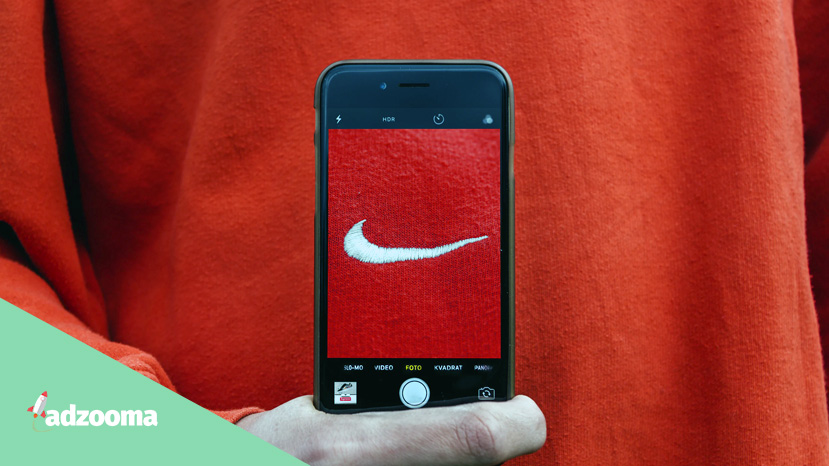Brands like Wendy’s have over 3.7 million followers on Twitter and are publicly celebrated for their witty online personality. Trying to cash in on their success, they’ve left a wave of brands testing this technique with strong personalities of their own.
But how successful is this tactic?
To find out, we surveyed 378 people* to find out what they think about brands with strong personalities and how it influences their purchasing decisions.
Here’s what we found.
57.5% of customers buy from brands with strong personalities
51.2% of people have purchased from a brand because of the way they spoke online.
What’s more, 57.5% of customers said they are more likely to buy from brands with strong personalities.
29.9% of people have said that they wouldn’t be influenced either way, and just 12.7% of people have said they would be less likely to buy from brands with a strong personality.
“I absolutely love brands that have a very strong personality. It’s the same way that people would like to follow a person with a strong personality as well. There’s just something about charismatic and attractive about them.”
Kenny Trinh, Managing Editor of Netbooknews
Friendly personalities are what customers want
When it comes down to the personalities customers resonate with most, 35.1% of people say that they prefer brands to talk in a friendly and conversational way.
In addition:
- 13.1% of people prefer a professional tone
- 13.1% of people preferred a fun or ‘quirky’ tone
- 2.4% of people preferred a sarcastic tone
- 21.4% of people prefer a mixture of all
There’s a real divide in what people want a brand’s personality to be. Although friendly personalities are in the lead here, it won’t work for every company.
Getting it wrong can also cause you to lose customers, as 55.7% of people have unfollowed a brand for the way they speak online.
“I think it’s great to see all these different brands speaking online in different tones and voices. It makes it more exciting and makes each brand unique. I’d much rather buy from a brand that has clearly found their voice and represents that personality in everything they do than one which just doesn’t seem to be trying at all.”
Carla Diaz, Cofounder of Broadband Search
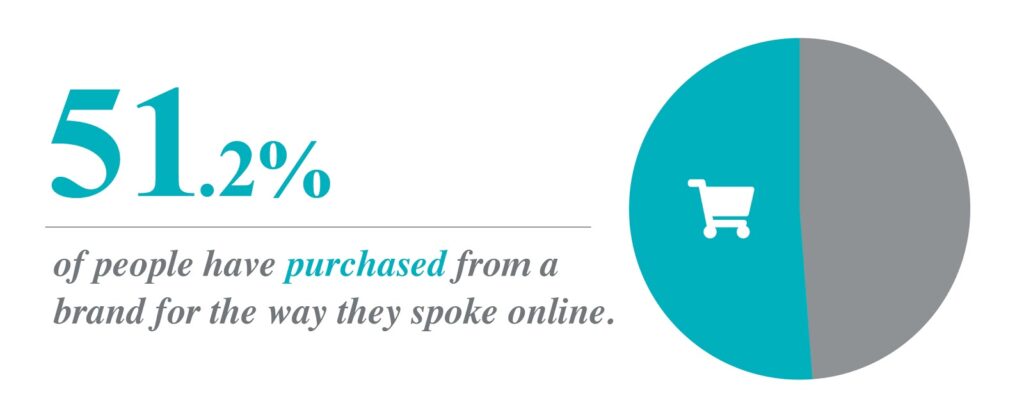
Polarising personalities
“Every person differs on how he/she takes the ad he/she is seeing – some may like a taste of humour, some may be looking for a more professional tone.”
Sonya Schwartz, Founder of Her Norm
People are different. There’s not one single person that’s loved by everyone. Even Tom Hanks can’t win them all. By incorporating a personality into a brand, you’re immediately going to turn some people away.
But there is a bright side to this.
Jake Rheude, VP of marketing at Red Stag Fulfillment, stresses the importance of brand personalities as a crucial factor in how brands connect with their audience.
Personalities are a way to break the ice. It humanises a brand, making them easier for people to talk to. The more people talk to and engage with a brand, the more they’ll remember it. So, when the time comes to buy, there’s only one name on their mind.
“The more a brand portrays a person-like characteristic, the more it can create a connection to its customers or clients. However, the same with a real individual, brands also have different personalities that greatly impact how audiences would react and support them.
Samantha Moss, Editor & Content Ambassador at Romantific
Stronger personalities, stronger brand recall
“It’s inspiring to see someone who doesn’t try to be a conformist and is willing to take a stand for themselves. Even if you dislike it, you will remember this kind of strong personality and brand – there’s no denying that.”
Dmytro Okunyev, Founder of Chanty
Strong personalities can be polarising for the audience, but they are also more likely to be remembered. Good or bad, strong personalities are great tools for brand recall.
To Brian Robben, CEO of Robben Media, having a strong personality can also be seen as an endorsement for the brand, as “No one gets loud, reasonably, unless they are confident in their product or service”.
With so much competition online, it could be a case of who shouts the loudest wins.
“[Brand personalities don’t] always influence my purchasing decisions, but it certainly influences my daily conversations with friends.”
Cathay Pedrayes, Lifestyle Expert
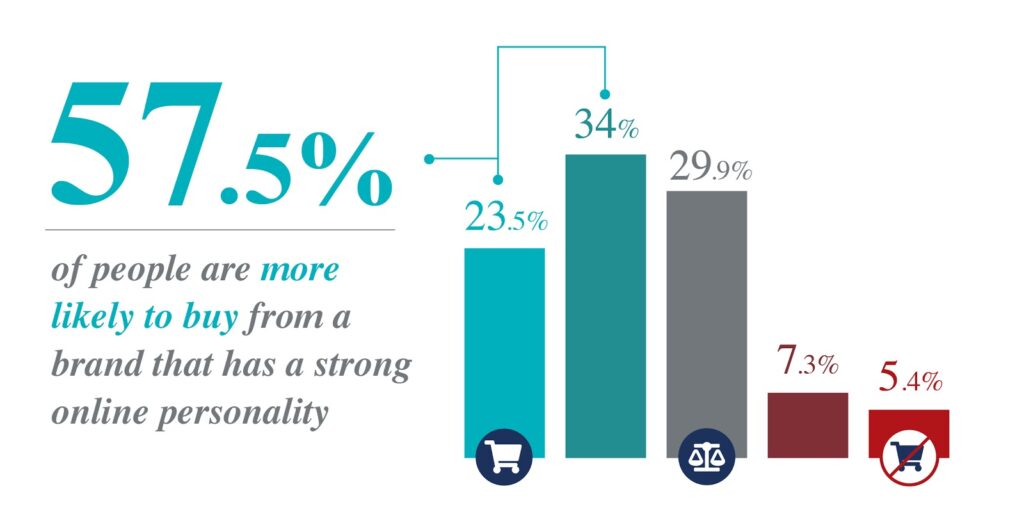
Mr Robot-No
“I prefer a genuine voice, that is a mix of friendly, funny and informative. Brands that are too professional come off as a bit robotic to me, and I tune out immediately.”
David Foley, Founder of Unified Cosmos
On the opposite end of the spectrum, you have brands that avoid personality to the extent of becoming emotionless robots. This isn’t great either, as a robotic tone of voice isn’t likely to captivate or engage your audience.
As John Linden of Mirror Coop says, “No one is on social media for the professional side of life; that’s already what people have to face at work, so they log on to social media to unwind”.
Customers aren’t on social media to be sold to. They’re there to unwind, talk to family and friends and be entertained. If your businesses can fit into that circle, they’re much more likely to remember and engage with your brand.
This may also be the reason 35.1% of people prefer brands to speak in friendly and conversational ways online.
Be true to your brand
“Whatever your personality or voice, use it, be consistent and make sure that it is honest, authentic and true to you and your brand. If you do, you’ll naturally attract the customer who is looking for you and what you’re selling or talking about. The worst thing to be is ambiguous, boring or stuck in the middle.”
Chris Fernandez, CEO of Women’s Health Interactive
Brain V. Folmer of FirstLook, states that brand personalities depend on the industry and category the brand is in. As an example, Brain listed Ugly Drinks, who use a cheeky tone-of-voice and often use colloquial text speak, like “git” “gon” and “u”.

This tone of voice works for Ugly Drinks because they are an alternative soft drinks company aimed at younger generations. It fits into their brand value of honesty and ‘no-sugar coating’. It wouldn’t be appropriate for, say up-market brand Gucci to use this language. It goes against the image they’ve built from themselves of class and sophisticated fashion.
Basically, it’s all about your audience and how you can communicate and connect with them. If sarcastic or witty tones are what they love and enjoy, then it’s what’s going to resonate and work well for your brand.
“Effective branding is less about having a strong personality online and more about having a distinct personality that makes sense, given what the product or service is selling. The most relevant the brand is to the consumer and followers set of values, the more likely they are to follow. I don’t care how a brand speaks – I only care if they are doing it memorably, consistently, and aligning with their brand values.”
Kimberly Solarz Gordon, Brand Strategist at KSG Group LLC
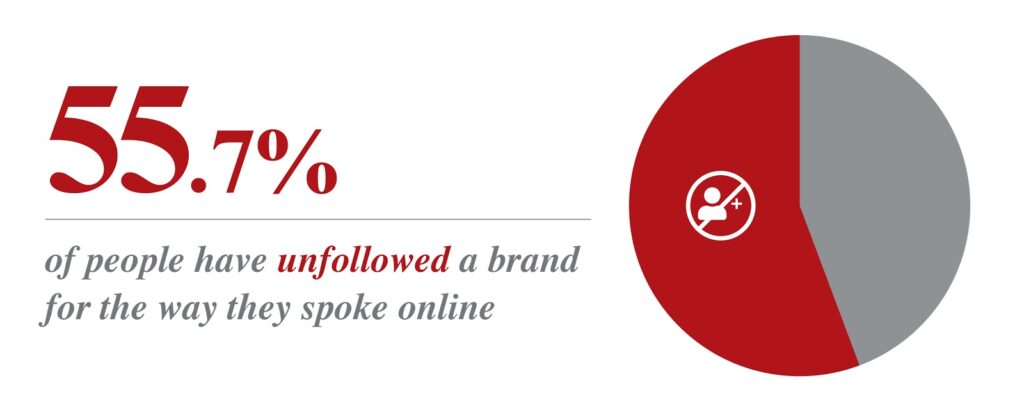
Has the pandemic solidified the need for personas?
The global pandemic saw a huge boom in local buying, particularly within the food industry. Approximately a third of households increased their digital spend, while 38% of consumers said they will continue to buy from the same stores they visited at the beginning of the crisis.
Micheal D. Brown, Director of Fresh Results Institute, states that because of the pandemic, “Customers are buying more emotionally these days. This means they would naturally go with a brand they have a sentimental attachment to.”
The pandemic has caused an economic crisis, meaning customers are much more careful about where they spend their money. Customers want to buy from brands they trust, including local and friendly brands where customers believe their spending power makes a difference.
Don’t be down with the kids
Of the personalities that we questioned, there was one that received a more negative response than others. This is brands that are ‘over the top’ and post memes in an effort to connect with Gen Z audiences.
Sandra Hurley, Operations Manager of Hayden Girls says: “I’m afraid I can’t take the second-hand embarrassment. I am forced to unfollow and avoid shopping there”.
Embarrassment is not a good feeling to envoke from your audience.

If you want to see anymore, there’s an entire Reddit thread titled ‘How do you do, fellow kids’ devoted to the most awkward and cringe-worthy examples. Yikes.
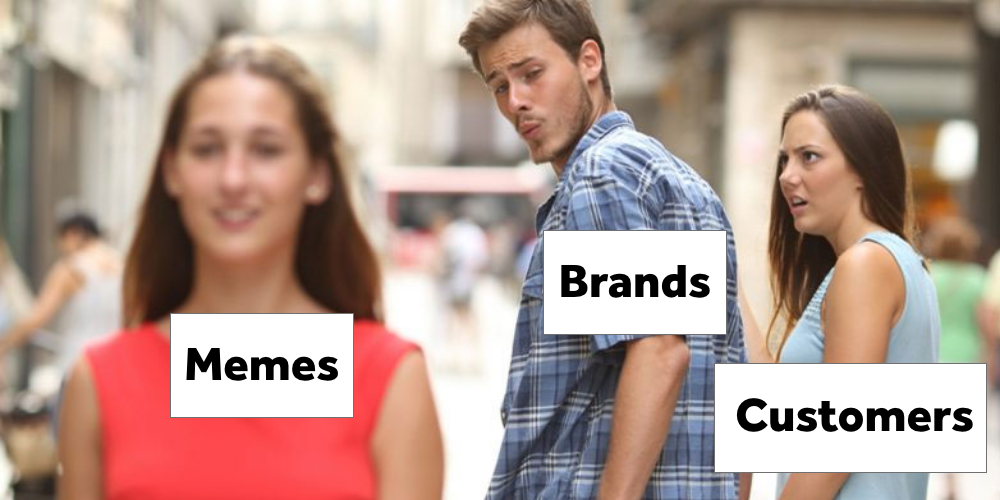
“If it’s a major company trying to cash in on meme culture, without grasping its subtleties, I’m probably going to unfollow it or keep an eye on it as an example of what not to do.”
Domantas Gudeliauskas, Marketing Manager at Zyro
Knowing when to turn it on
31.4% of people said that they wanted brands to speak in a mixture of different personalities. This doesn’t mean that one day you should be sarcastic and the next friendly – as this will confuse your customer base and muddle your branding.
It’s about knowing when to use personalities and when you need to tone it down, such as in your customer service department.
One person has proved that by pretending to be the customer service department for a number of brands and commenting on people’s posts on Facebook. In fact, there’s an entire page dedicated to it.
Let me just say, people are not happy when they don’t get a professional answer back. It brings out the worst in them and results in many threats about getting him fired.
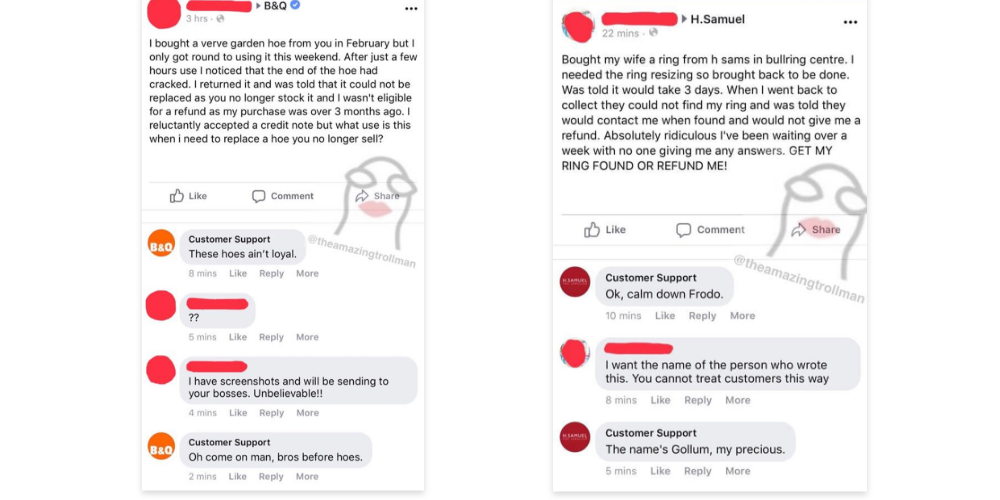
As amusing as these examples are, it shows an inherent difficulty of brand personalities. They have to speak out but not offend. Gain attention by being different, but also provide the friendly, supportive and professional tone that people expect when they have a problem.
Brand personalities are not permanent. They’re a tool used to gain attention and build relationships with customers, but cannot be used across all aspects of the business.
And we shouldn’t expect them to either. Brands are not single entities, they’re made up of several different people. We should expect brands to be as multifaceted as they serve different functions for their customers.
Should personalities get political?
If you decide to use a strong personality for your brand, does that mean you should be posting about politics?
In another investigation, we found out what customers actually think about brands getting political. The majority of people found them to be insincere, with 43.5% of people thinking that it is just a way for customers to jump on the bandwagon.
In addition, politics can worsen customers’ opinions of a brand and potentially damage your online engagement, as 42.3% of people will unfollow a brand for speaking out about politics.
However, it can increase sales. 63% of people are more likely to buy from a brand that speaks out about politics, but only if customers agree with you. If they didn’t, 67.5% would be unlikely to ever buy from your brand.
If you really want to engage with your customers on social, you might want to consider having a strong personality but avoiding politics.
Methodology
Data was gathered from 378 anonymous respondents via surveyswap.io. No participant was paid for their response, and the survey was made available to people of all backgrounds, ages, genders and ethnicities to avoid any bias in responses.

